Why have applications to the Civil Service Fast Stream plummetted?
A more in-depth look at what's happening - with quotes and comments from those involved
Applications to the Civil Service Fast Stream have plummetted over the last three years - from 64,697 in 2020 to just 26,899 today. Every single sub-stream has dropped by at least 45% with some - such as the Social Research Stream - by 70% or more.

Why? A recent pair of Tweets1 by me were seen by over half a million people, prompted and was cited in a Telegraph article and resulted in a very wide variety of comments - many from young people who’d applied or considered applying, from former fast streamers, and others. This is a more detailed look at the comments in their own words2 - and the statistics that lie behind them.
The biggest factors cited were:
Pay and salary, often linked to house / rent prices - by far the most common issue cited, by about half of respondents3.
A collapse in the training offered - including the closure of the National School of Goverment.
A smaller, but significant, number saying that it no longer offered any real advantage in reaching senior roles.
We’ll have a look at these - and a few others. But before we start we should look briefly at the claim that this has been driven entirely by the ‘pause’ of the scheme in 2022.
It seems very likely that this did have an impact on the application numbers for 2023. But the drop between 2021 and 2022 was bigger both in real terms (20,000 vs 12,000) as well as proportionally (35% vs 31%) than the fall from 2022 to 2023. So that may be a factor, but can’t explain the whole fall.
Pay
The starting salary for the Civil Service Fast Stream today is £31,186. Now on one level, that’s a good salary: the median full-time salary in the UK is just under £35,000. It compares well to, for example, the Rolls-Royce graduate scheme (£29,000), while being lower than most graduate schemes in the top finance and law firms. So far, so always. But how does it compare to the past?
As we can see, the decline in real pay applies to all grades - and most of all to the more senior ones. The pension offer is worse too4, as is annual leave.
I joined the Fast Stream in 2006 on a salary of £23,800. If that had increased by inflation, that would be worth £39,150 - or nearly £8k more than the current starting salary. Or, conversely, today’s starting salary would have been worth less than £19k in 2006. Salary wasn’t the most important thing to me when choosing a job - investment banking never appealed - but I’m not sure I’d have wanted to move to London on less than £19k.
On top of this, we have to think about what’s happened to house prices, and rent - which has been terrible.
Which we can also see in the collapse of home-ownership - and, of course, in the increase in rents.
So it’s no surprise that many of the comments explicitly linked the salary to the affordability of housing.
Collapse in the quality of the training
This was the second most cited reason, with perhaps 20-25% of people citing it.
These were some of the saddest comments for me to read. Training really did used to be gold standard: preparing FSers not just for their current role, but a broad range of senior roles. I had courses on the principles of Parliament, Government and the Civil Service, week-long courses on micro and macro economics, leadership training, introductions to government finance and more. Even though after twelve years I ultimately decided the Civil Sevice wasn’t for me, the training I received stood me in very good stead throughout my career in Whitehall - and beyond.
Towards the end of my time as a civil servant, from 2015 onwards - and when I worked in Whitehall again between 2019 and 2022 - I did notice that fast streamers seemed to be getting a lot less good (and simply less) training than I’d received. This was also noticeable in terms of the knowledge of (recent) ex-Fast Streamers. Whereas before one could count on people having real breadth of knowledge, more recently, unless someone has actually worked on secondary legislation - or on FOI requests - or in a finance role - they’re less likely to know anything about it. That’s not their fault; it’s simply that the broad-based training doesn’t exist any longer.
Several comments connected this to the closure of the National School of Government - and the failure to replace it with a comprehensive alternative. This was also recognised by the Parliamentary Public Administration and Constitutional Affairs Committee in 2018, who found that, “It is clear that key aspects of professional development of civil servants which used to be provided by the NSG are missing.”
No longer a good route to reach the top
About 10% made the interesting observation that it was no longer the best/a reliable route to senior roles. Some said working in the private sector would let you come in in 5-6 years to the SCS; the FS would take longer. Others that it was just as easy to work up from HEO/SEO.
There's a degree to which it's good there are other routes: we want the civil service to seek out talent from all sources, including those coming in with other experience. But it’s a problem if a prestigious grad scheme is seen as actively worse than other routes.
Again, in my more recent time in Government I can remember being shocked by this. I had one conversation with a young and very talented civil servant who told me they didn’t want to apply to the Fast Stream because they’d be ‘stuck on it for 3-4 years’, while if they stayed out of it they figured they could get promoted to Grade 7 in just one or two. They were probably right - I saw a number of talented people getting promoted that fast.
And again, I absolutely don’t want to hold back brilliant people who come in from outside the Fast Stream. One of the best civil servants I ever worked with did this, rightly has risen quickly, and is now a Director after 10-12 years. We should always be open to talent from many different places. And I understand that in the current pay environment, getting promoted is often the only way people can see there salary keep pace with inflation. But (a) there is value in having people undertake broad training on a graduate scheme - this is why many private sector companies have such schemes; and (b) if the prestigious graduate scheme is seen as something that actively slows you down, that’s a problem!
Other reasons
A number of other reasons were cited, including the application process, evil Tories, wokery and more. Here are a few of them:
The application process:
On one level, people will always groan about an application process - and any process that receives tens of thousands of applicants a year will always have to have a degree of automation. Still, there was a common theme about lack of feedback in the process, which one thinks could be provided (even if in an automated way, by the computer that marked the script)
One person made the more interesting point that they felt the application process reflected the organisation itself, and not in a good way:
Too woke and/or too Tory:
About 10% of comments cited their unwillingness to work for the current Conservative Government, or how Ministers attacking the civil service decreased their willingness to work for it. A couple of these will give you the gist:
And roughly a similar number argued that the civil service was too ‘woke’. Again, a couple will give you the gist:
One person made the slightly more interesting argument that a focus on diversity might be putting off ‘traditional’ (presumably white, male) applicants at a faster rate than the target groups were being attracted:
I don’t want to completely disregard these quotes: I’m sure the people believe them sincerely and I’ve no doubt that both will put of a non-trivial number of people. I also think that in more polarised times, such as now, fewer people will be attracted to a career that prizes impartiality than in the heady days of 2006 when we used to complain that ‘the parties are all to similar to one another’.5 I can certainly empathise with that myself.
At the same time, I think there will always be people who feel that, and that most of the people who do feel that, are probably going to be happier not applying to the Fast Stream.
Too London-centric
A couple of people said this. The civil service is a lot less London-centric than it was - but there’s no doubt it still is. Maybe the new ‘Delivery’ scheme, launching this year, can have roles with no requirement to move to London - that would seem like a positive move, especially with so many of the major delivery agencies based outside.
And then there were a few more general points:
How much should we worry about this?
So how much should we worry about all this? One commenter made the very good point that a scheme with over 20,000 applicants still seems pretty competitive. So how do the last three years compare with previous years?
The truth is that the recent fall comes after a longer-term rise in application numbers (starting well before COVID) - and that application numbers are still higher than in the first half of the 2010s:
And if we go back further, we see that numbers have always fluctuated6:
Wider economic conditions clearly play a major part, with numbers shooting up after the financial crisis in 2008. No doubt the strong labour market now is a major factor. And we should note that application numbers are now almost double what they were when I applied - although this doesn’t tell the whole story, as there are more than double the number of places available, due primarily to a large number of new technical, specialist schemes such as property, commercial and finance having opened7.
So do we need to worry at all? I’d answer that while we shouldn’t panic then yes, we should worry - at least a little bit.
We’re in a situation where applications have fallen by 55% in just three years. And yes, a lot of that may be to do with a vibrant private sector jobs market, a tight labour market and salaries falling behind private sector equivalents - but does anyone think that will change soon?
Pendulums don’t reverse course by themselves8. Thermostatic effects are made up of individual people actually doing something about the situation. A further fall over the next 2-3 years could see applications falling to only 10,000 - 15,000 a year: and most importantly, these wouldn’t be the best candidates, who’d be going elsewhere.
To keep the scheme competitive, three things are needed:
Most importantly, pay must be competitive. This is tough in the current environment - but it has to be done. Two potential ways of helping to bring this about (not just for the Fast Stream, but more broadly), without costing the taxpayer any more money, would be:
At Spending Reviews, Permanent Secretaries should be allowed orencouraged to offer up higher head-count reductions in exchange for higher salary increases (potentially targeted at the grades/professions where this is most needed). A smaller, nimbler, better paid civil service would be more aligned with the highest performing civil services, such as that of Singapore.
Allow civil servants to swap a portion of pension contributions to headline salary. The total (employee + employer) contribution rate for Alpha, the main scheme, is over 30% and it accrues at 2.32% of annual earnings each year. Allowing employees to swap up to 10% of this into headline salary, in exchange for a lower accrual rate9, could give people up to a 10% salary boost - and still leave them with a pension far better than most in the private sector10.
Revitalise the training offer - make it gold standard again. This should almost certainly include the restoration of the National School of Government (including a residential base), or an equivalent.
Ensure it's seen as at least as good as other routes to get to the Senior Civil Service. There’s no silver bullet to this, but it matters.
There are other tweaks I’d make - including a delivery-orientated route based solely outside London, and auto-generated meaningful feedback on the application process - but those are the main ones.
Despite everything, I’d still recommend the Civil Service as a great place to work. A good Fast Stream is essential to the future of the civil service - and transformed my life and that of many others - so I hope people take the action that’s necessary.
Or ‘X’s
All quotes are presented without endorsement. I do not know any of the people who are quoted here and it is entirely possible that some of these people have said horrible things somewhere else on the internet; I do not know this and have not checked. The inclusion of a single quote here should not be taken as any endorsement or validation of any person quoted, or anything else they might have said.
All of such percentages are approximate - and add up to over 100% as many people cited more than one reason.
Though still extremely good - and inded it would almost certainly help recruitment to allow some civil servants to take more pay now in exchange for a less good pension.
Remember that complaint?
No, I’m not sure what happened in 2004.
For the avoidance of doubt, I think this is a good thing.
Well, real-life pendulums do. But metaphorical ones usually don’t.
Calculated at whatever the appropriate actuarial rate is.
This would even save the Government money as the salary would be taxed.





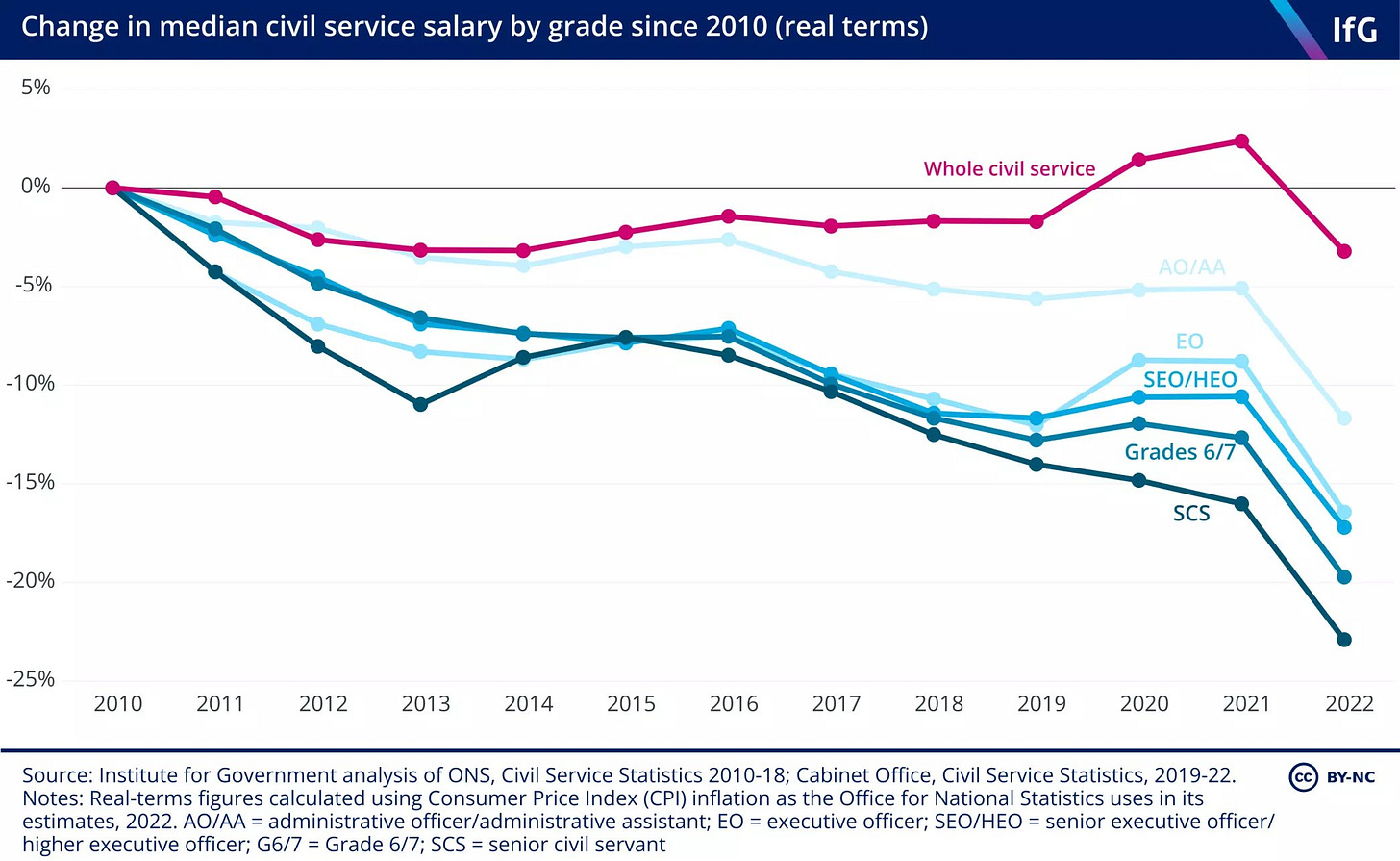



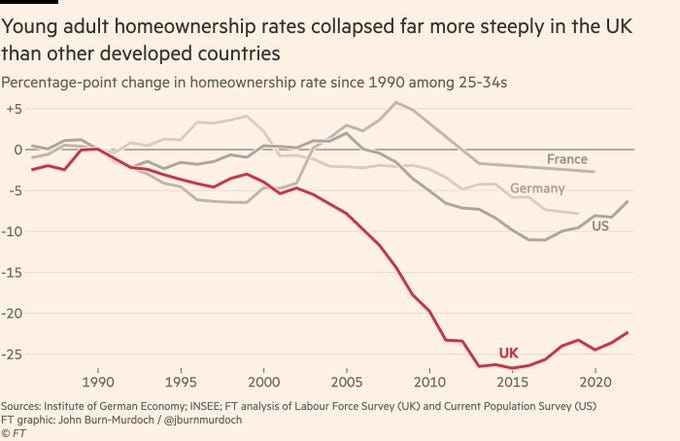
















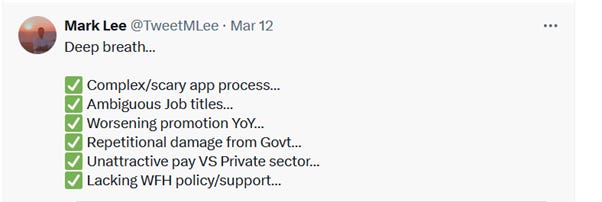

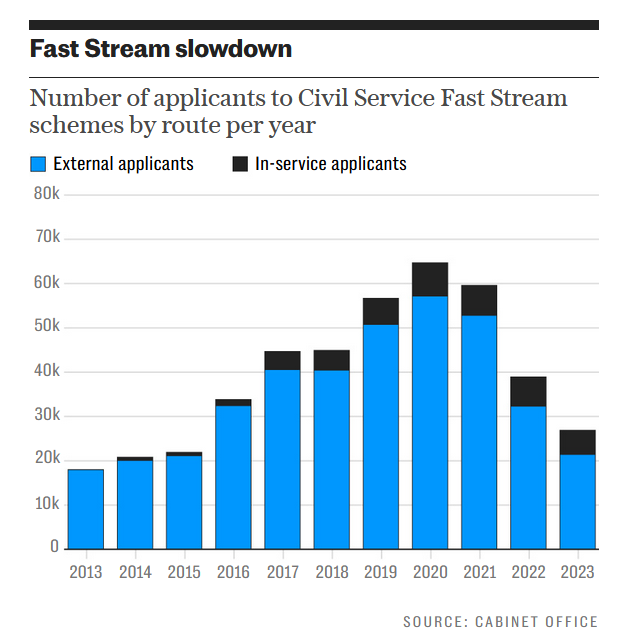
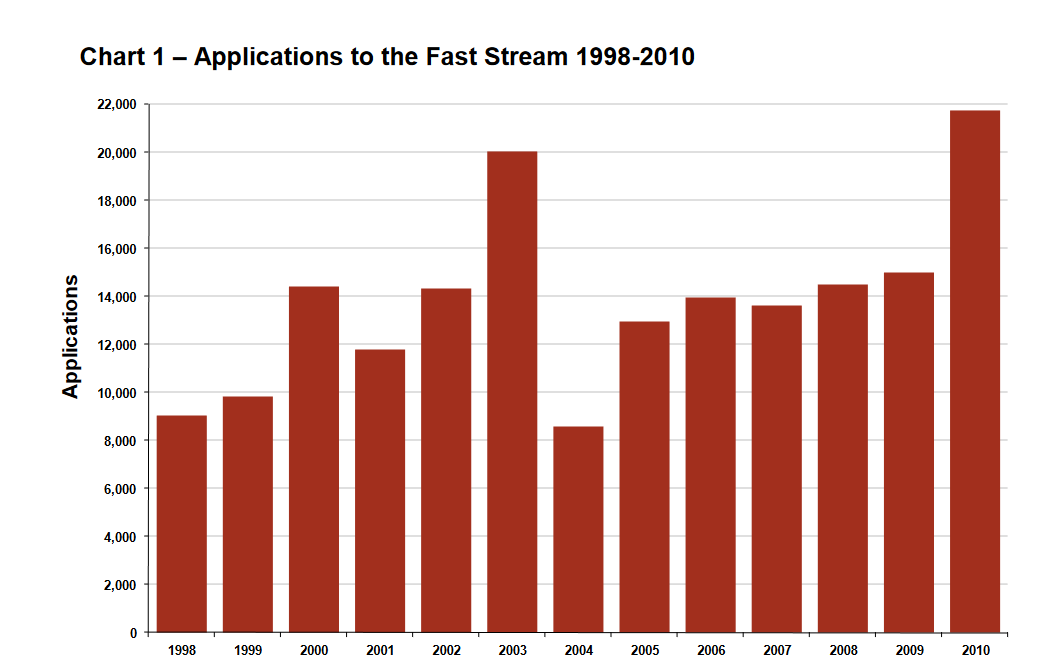



Thanks for the read. I was an applicant this year, who failed to get beyond the first stage (three online exercises). I was scored higher than majority in the numerical reasoning test, and the work style test, but average in the interpersonal test. I didn’t realise that in the interpersonal test you basically had to say you were good at everything! I passed through many more stages of comparable graduate schemes, although that isn’t necessarily that indicative. I’ll apply again next year, but expect that if I do join the civil service, I will do so directly.
I’m in my final year at a top 10 university. The majority of my talented university friends are not aware of the fast stream, or indeed a career in the civil service, as being a viable career route for them, due to the poor remuneration and the idea (/misconception) that working in government isn’t for them (if they are an engineer or a scientist). A few of those scientists/engineers are being snapped up by the armed forces, though.
The FDA ran good, virtual, sessions on how the application process would work for my university, but not many people attended, despite good promotion.
"Training really did used to be gold standard" -> use